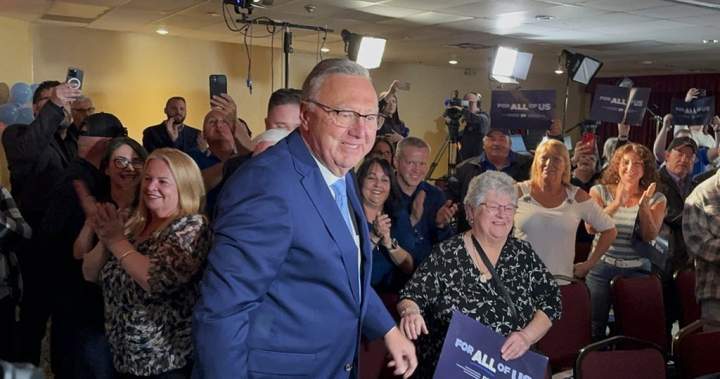Voters in Newfoundland and Labrador showed they were in the mood for a big change on Tuesday by ousting the governing Liberals after ten years in power and handing a slim majority win to the Progressive Conservatives.
As the final ballots were counted at the conclusion of the autumn election campaign, Tony Wakeham’s Tories edged into a small lead after a white-knuckle, see-saw battle, and then steadily pulled ahead of Premier John Hogan’s Liberals.
In his victory speech, Wakeham took aim at pundits who had predicted another Liberal win. “I’ve spent over 30 years of my life coaching basketball, and you learn that no stat is less important than the score at halftime,” he said.
“It was only a couple of months ago that a whole lot of people were looking at the halftime score and thinking that this election was over …. Tonight, we all know it because we all feel it — there is nothing quite like a comeback.”
Three hours after the polls closed, Progressive Conservatives had won 21 of the legislature’s 40 ridings, a gain of seven seats. The Liberals were elected in 15 ridings, a decline of six seats. The New Democrats led by Jim Dinn doubled their seat count to two, and two well-known Independents were re-elected.
Newfoundland and Labrador election law says ridings with a margin of victory of 10 votes or less are subject to automatic recounts. Tuesday’s results indicate the smallest margin was in Lewisporte — Twillingate, where Tory candidate Mark Butt beat the Liberals’ Derek Bennett by 18 votes.
The Tories won the popular vote with 44.37 per cent of votes cast, compared with the 43.43 per cent for the Liberals.

Get breaking National news
For news impacting Canada and around the world, sign up for breaking news alerts delivered directly to you when they happen.
Wakeham said he won over voters by consistently talking about health care, crime and pocketbook issues. Throughout the campaign, he repeatedly asked voters whether they were better off under the Liberals, who were seeking a fourth consecutive term in office.
The Tory leader also criticized Hogan’s decision to endorse a proposed multibillion-dollar energy deal with Quebec, saying the draft agreement wasn’t good enough. The former health-care bureaucrat pledged to have the tentative agreement reviewed by an independent third party, pointing to lessons learned from the province’s previous energy project failures.
“I will demand a true, independent review that will share its conclusions with the public,” Wakeham told supporters on Tuesday. “I will use that review to fix this deal or demand a better one. Given the generational stakes, I will not sign any deal that Newfoundlanders and Labradorians do not approve in a referendum.”
As well, one of Wakeham’s other priorities will be dealing with the province’s ballooning debt, which is expected to reach almost $20 billion next year. That’s the largest per capita provincial debt in the country.
The Tory win reflects a trend that started in the spring, when the federal Conservatives led by Pierre Poilievre won three rural seats in Newfoundland — a gain of two seats — despite the federal Liberals’ election win under Prime Minister Mark Carney. On Tuesday, the provincial Progressive Conservatives picked up seats in rural Newfoundland and across Labrador.
As for the Liberals, their campaign was partially hobbled by the loss of several cabinet ministers who quit before the election race began, including Siobhan Coady, John Haggie, Gerry Byrne, Andrew Parsons and Tom Osborne.
Hogan, a 47-year-old lawyer, had said the proposed energy deal with Quebec was “the election issue.” He told voters that the memorandum of understanding between Hydro-Québec and Newfoundland and Labrador Hydro could inject $225 billion into the provincial treasury over 50 years, providing economic salvation for the financially fragile province.
The tentative agreement would see Hydro-Québec pay much more for power from the Churchill Falls plant in Labrador, which the Quebec government helped build in the late 1960s. The deal is also expected to lead to new hydroelectric projects along the Churchill River.
It will also terminate the existing Churchill Falls contract 16 years earlier than expected, a change that recognizes the unfairness of Hydro-Québec buying the majority of the electricity at rock-bottom prices for decades.
In a speech to his supporters in St. John’s, Hogan urged Wakeham to “stay the course” with Churchill Falls. “It is the best opportunity to secure our province’s future,” Horgan said. “So listen to the experts because there is no better deal, but there is a better future for our province.”
Meanwhile, the New Democratic Party was not expected to be a contender in the election, having never held more than five seats in the legislature.
“The fact is, guess what? It’s going to be the NDP putting forward the ideas that will benefit all people of this province,” Dinn, a 65-year-old former teacher, told his supporters in St. John’s on Tuesday night. He was re-elected in his St. John’s riding.
— With files from Michael MacDonald in Halifax
© 2025 The Canadian Press




